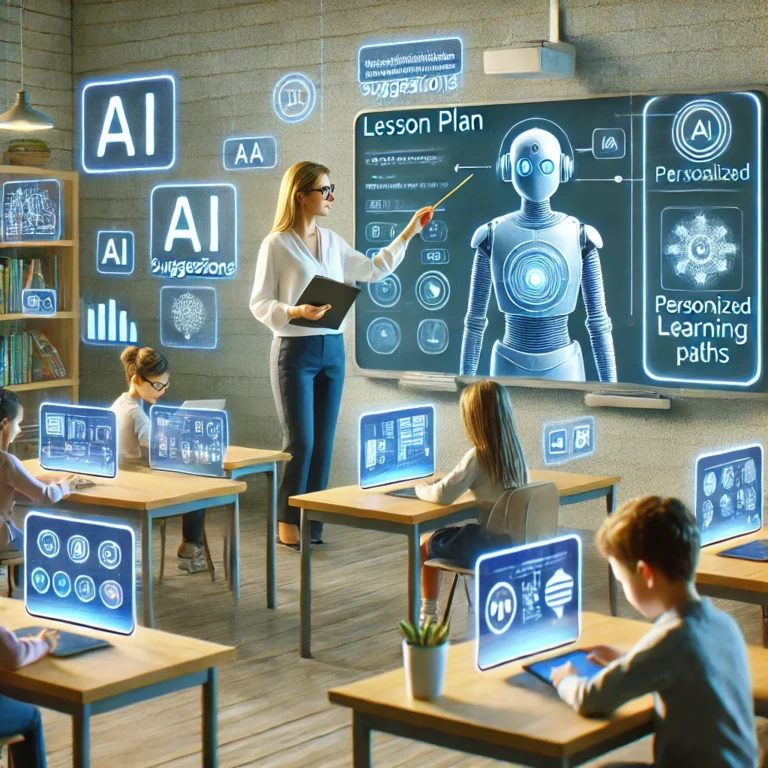Artificial Intelligence (AI) is transforming various industries, and education is no exception. Integrating AI into lesson planning is revolutionizing how educators design, deliver, and assess their lessons. This blog will explore the benefits of AI in lesson planning, practical ways to implement it, and the future of AI in education.
1. Personalized Learning ExperiencesAI enables personalized learning by analyzing student data and tailoring lessons to meet individual needs. Tools like Smart Sparrow and DreamBox use AI to adjust the difficulty level of tasks based on student performance, ensuring that each student progresses at their own pace. This personalization enhances student engagement and understanding, as lessons are customized to suit different learning styles and abilities.
2. Efficient Resource ManagementAI streamlines resource management, making it easier for teachers to find and organize educational materials. Platforms like Knewton and IBM Watson Education analyze vast amounts of educational content to recommend the most relevant resources based on the lesson objectives and student needs. This saves teachers time and ensures that they have access to high-quality materials that align with their teaching goals.
3. Automating Administrative TasksOne of the significant advantages of AI in lesson planning is its ability to automate administrative tasks, allowing teachers to focus more on teaching. AI tools can handle tasks such as grading assignments, tracking attendance, and generating reports. For example, platforms like Gradescope use AI to grade assignments quickly and accurately, providing instant feedback to students. This automation not only reduces the workload for teachers but also speeds up the feedback process, helping students learn more effectively.
4. Enhancing Collaborative LearningAI can facilitate collaborative learning by connecting students with peers and educators worldwide. Platforms like Century Tech use AI to create collaborative learning environments where students can work together on projects, share resources, and receive feedback from teachers and peers. This global collaboration enhances the learning experience by exposing students to diverse perspectives and ideas.
5. Data-Driven Decision MakingAI provides educators with valuable insights into student performance through data analysis. By analyzing patterns in student behavior, AI tools can identify areas where students struggle and suggest targeted interventions. For example, platforms like Brightspace Insights offer data-driven insights that help teachers make informed decisions about their teaching strategies. This data-driven approach ensures that teachers can address student needs promptly and effectively.
6. Preparing Students for the FutureIntegrating AI into lesson planning not only benefits teachers but also prepares students for the future. As AI continues to play a significant role in various industries, students who are exposed to AI-driven learning environments will be better equipped to navigate the AI-driven world. By incorporating AI into their lessons, teachers can help students develop critical thinking, problem-solving, and digital literacy skills, which are essential for future success.
7. Overcoming Challenges in AI IntegrationWhile the benefits of AI in lesson planning are clear, integrating AI into the classroom comes with its challenges. Teachers need to be trained on how to use AI tools effectively, and schools need to invest in the necessary infrastructure. Additionally, there are concerns about data privacy and the ethical implications of using AI in education. It is crucial for educators and policymakers to address these challenges to ensure that AI is used responsibly and effectively in education.
8. The Future of AI in Lesson PlanningThe future of AI in lesson planning looks promising, with advancements in technology likely to bring even more innovative solutions to education. As AI continues to evolve, we can expect more sophisticated tools that offer deeper insights into student learning and more personalized teaching strategies. The integration of AI in education will continue to grow, making it an indispensable tool for educators in the 21st century.
Conclusion
Integrating AI into lesson planning offers numerous benefits, from personalized learning experiences to efficient resource management and data-driven decision-making. While there are challenges to overcome, the potential of AI to revolutionize education is undeniable. By embracing AI, educators can enhance their teaching practices and better prepare students for the future. The key is to approach AI integration thoughtfully, ensuring that it complements and enhances traditional teaching methods.


